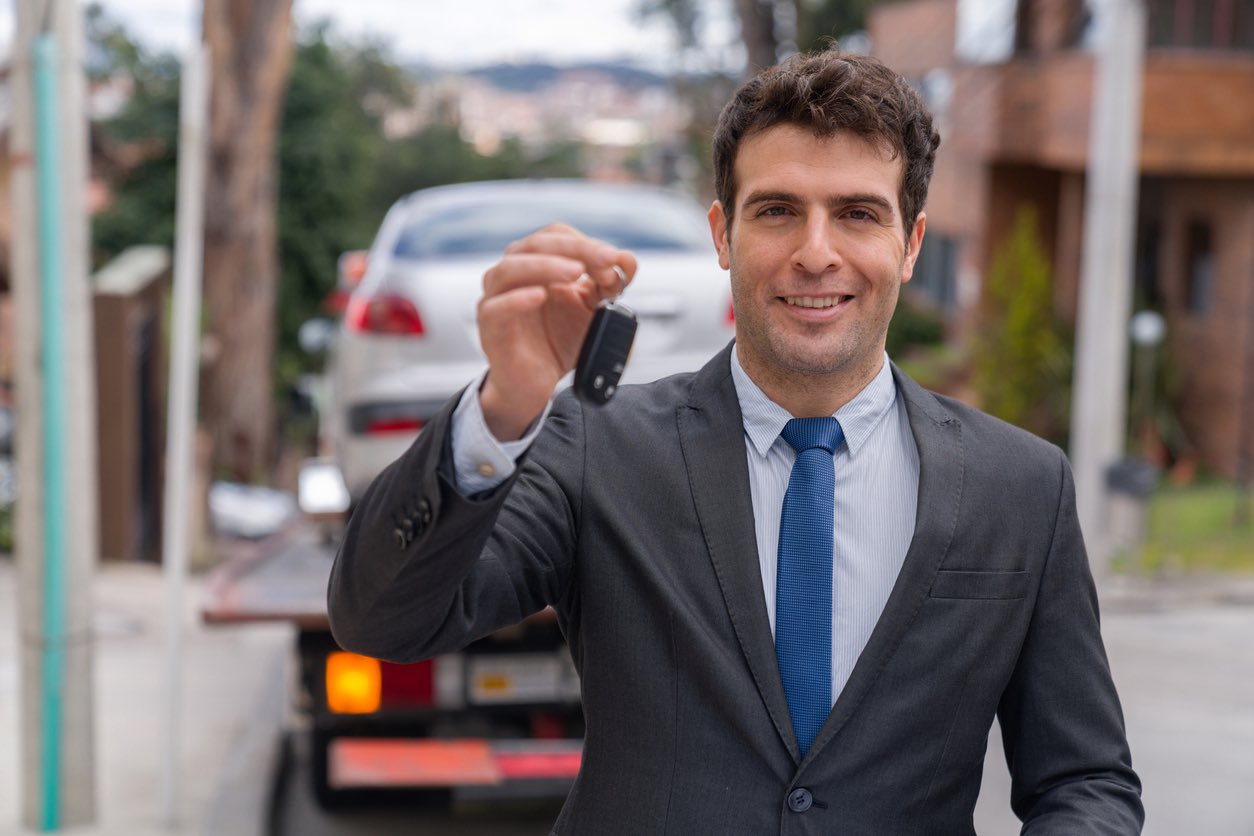Our phones’ familiar ring frequently signals news from friends and family, work updates, or even the sporadic promotional offer. However, for many people, that same ring now represents a growing danger. Imagine yourself in the middle of a task when your phone buzzes and an all-too-familiar automated voice informs you that the warranty on your car is about to expire. Numerous Americans encounter this situation on a daily basis. These unwanted phone calls, which frequently contain ominous notices about expiring auto warranties, have permeated every aspect of our lives. No matter how strict our privacy settings are or how frequently we change our phone numbers, these tenacious con artists always seem to have our contact information on speed dial.
The opportunities for fraud and scams have increased as we navigate the vast digital landscape of the 21st century, especially in industries like the auto industry. The development of digital communication tools has been advantageous in many ways, but it has also given con artists sophisticated tools to prey on gullible people. This blog aims to inform readers as well as shed light on the history and changing strategies of these auto warranty phone scams. Knowledge that can act as a shield, enabling us to distinguish between genuine offers and trickery traps and protect our hard-earned money.
Few scams in the lengthy history of fraud have demonstrated the adaptability and persistence of auto warranty phone scams. What started as straightforward cold calls has developed into a sophisticated operation that uses data and technology to target unwary vehicle owners. As we explore the history of this dishonest practice, it becomes clear how important it is to comprehend its genesis and development. By following its lead, we can better predict its next moves and prepare ourselves to counter its ever-evolving strategies.
The Beginning of Deceit: The first seeds of deception were planted with the idea of extended warranties. As these warranties became essential to the auto industry, shady con artists saw an opportunity. Their early strategies were crude, frequently relying on the element of surprise and the general lack of knowledge about such scams.
During the Landline Era: Landlines were the main form of communication before the advent of cell phones and the internet. Scammers would spend hours dialing arbitrary numbers in the hopes of connecting with a real vehicle owner and making a profit. It was a game of chance, with a tiny chance of success but just enough to keep the scam going.
Robocalls: Casting a Wider Net: The emergence of robocalling was a result of late 20th-century technological advancements. For con artists, this automated system changed the game. They could now target thousands of numbers at once instead of just a few, increasing their chances of finding potential victims.
The Power of Data in the New Millennium: The scamming landscape underwent a significant change in the 2000s. Data became a precious commodity as the digital age progressed. Customer databases were acquired by scammers, either through dubious methods or outright theft. Their sales pitches became eerily accurate once they had access to specific information about vehicle owners, making it harder for people to distinguish between legitimate offers and scams.

Scammers have adapted to and evolved in the quick-paced digital age of today, becoming more cunning and sophisticated in their methods. They are no longer the enigmatic figures that lurk in the shadows; instead, they have emerged into the spotlight as actual organizations. With the development of technology and access to enormous amounts of data, these con artists have honed their strategies, making it harder for the average person to distinguish between a legitimate offer and a scam. This section delves into the contemporary landscape of auto warranty fraud, highlighting its sophisticated methods and the underlying motivations powering its dishonest activities.
Fraudulently Posing as Legal: The digital age has given con artists the tools they need to create extremely convincing facades. They’ve gotten good at impersonating legitimate businesses and frequently spoof caller IDs using technology. This implies that when your phone rings, the displayed number may appear to be from a reputable local company or even a government organization. These con artists have mastered the art of imitating real businesses’ phone menus to further their deception, making it harder for people to recognize the ruse.
The Devil is in the Details: The level of knowledge these con artists have is even more concerning. They frequently have extensive knowledge of potential victims. They appear to be experts on everything from the make and model of your car to its maintenance records and even previous warranty claims. This wealth of data, which is frequently obtained from data breaches or dishonest data sellers, is used to create pitches that sound incredibly genuine and are especially tailored for each customer.
The Ultimate Objective: The real goal of the con artist is hidden beneath all this sophistication and seeming authority. Their main goal hasn’t changed over the years: to trick car owners into handing over their money. They try to sell fictitious or worthless extended warranties as their product. They encourage hasty decisions by creating a sense of urgency, frequently by stating that warranties are about to expire. Many people find it difficult to resist the pressure, which is further increased by the allure of “exclusive” or “limited-time” deals.
Understanding the current landscape of these scams enables us to arm ourselves with the knowledge to recognize and evade these shady calls, ensuring our mental tranquility and the security of our money.

In the vast world of scams, those that combine technological prowess with psychological cunning frequently find success. Phone scams involving auto warranties are also common. These con artists are experts at deception; to draw their victims into their web, they combine traditional persuasion strategies with cutting-edge technological advancements. Understanding their techniques will enable us to protect our personal and financial information by better preparing ourselves to recognize these scams at a mile away.
The Art of Caller ID Spoofing: “Spoofing” is one of the tricks used by scammers most frequently. This entails tricking the caller ID system into displaying a reliable-looking phone number. It might be a number that resembles that of a nearby company, an organization run by the government, or even your own. The main objective? in order to get you to pick up the phone. Once you respond, they have the chance to fabricate a story and possibly deceive you.
Using The Fear Factor to Harness Emotions: Scammers are well aware of how strongly emotions can influence how people behave. They put their targets in a bind by engendering fear and a sense of urgency. Even the most logical people can become anxious when given warnings about a warranty on their car running out or impending expensive repairs. Many people might not question the legitimacy of the call during that anxious time, leaving them more open to the scam.
Making the Effort to Appear Legitimate: In some cases, the con artists may give accurate information about your car, including its make, model, and maintenance records. This accuracy is intended to give the appearance of legitimacy, which will make their pitch seem even more credible. It’s important to keep in mind that such information can be easily acquired or purchased in the modern digital age. Someone may not have your best interests in mind even if they are knowledgeable about your car.
We can stay one step ahead of the con artists if we are familiar with these cunning strategies. Since knowledge is power, it serves as our best line of defense against those trying to trick us.

Being vigilant about our personal and financial security is more important than ever in the modern digital age, where information flows freely and quickly. Scammers are getting more and more skilled, using a variety of strategies to trick and take advantage of gullible people. Although the threat is actual and constant, the good news is that we can greatly lower our susceptibility to these scams with the right information and preventative measures. This section explores practical tactics that can act as your initial line of defense against the devious schemes used by warranty scammers.
Keep Calm and Hang Up: It is easy to use but efficient. It’s best to hang up if you receive an unauthorized call, particularly if the caller demands that you take immediate action regarding your auto warranty. Keep in mind that sincere businesses will give you plenty of time to make your choice and won’t pressure you.
Your Privacy Is Important: Your financial and personal information may be used as a weapon by scammers. Always exercise caution when deciding with whom to share this information. It’s better to withhold your information if you didn’t initiate the contact or if something doesn’t feel right.
Understanding is Power: Do your homework before approving any extended warranties or making any financial commitments. Find out more about the business, check out customer feedback, and make sure they’re a real player in the market.
Cut Down on Unwanted Calls: Registering your phone number on the National Do Not Call Registry is a useful step you can take to reduce telemarketer calls. Even though it might not completely stop unwanted calls, it can greatly cut down on them and give you peace of mind.

The numerous options in the vast world of auto warranties frequently leave customers feeling confused and overwhelmed. Making informed choices has never been more crucial given the increase in phone scams and shady email offers. Dealerships stand out as the beacon of reliability in this chaotic environment because of their observable presence and well-established reputations. They not only give customers a sense of security, but also make sure they have all the information they need to choose the right options for their cars. The benefits of purchasing extended auto warranties directly from dealerships are covered in this section.
The Element of Trust: Any significant purchase contains the element of trust at its core. With their physical locations, dealerships provide a level of accountability that is difficult to match. They are a trustworthy source for such important purchases because their reputation is what keeps them in business. When you enter a dealership, you invest in a promise of quality and dependability rather than just purchasing a warranty.
Clearly Stated Terms: Understanding the complex terms and conditions of an extended car warranty is one of the most difficult aspects of the purchase. To ensure that they can adequately and understandably explain these terms, dealership staff members go through rigorous training. This guarantees that customers won’t be misled by jargon or secret clauses. On the other hand, warranties offered through cold calls or unsolicited emails frequently lack clarity, opening the door to misinterpretations and dangers.

Dealerships serve as pillars of reliability and trust for customers in the vast world of automotive transactions. But while many of us are wary of con games that prey on individual car owners, few are aware that con games can also target dealerships. These businesses, which we frequently regard as fortresses against fraud, are increasingly falling victim to sophisticated con games. Threats range from dishonest sellers posing as private companies to foreign buyers with questionable motives. The most common frauds against dealerships are examined in this section, along with the elaborate lies that these con artists tell.
Fraudulent Vehicle Exports: Dealerships may occasionally become oblivious to potential dangers due to the allure of foreign markets and the promise of lucrative deals. In the vehicle export scam, con artists frequently pose as foreign buyers and express interest in expensive or upscale vehicles. They kindly offer to pay more than the price stated in order to cover what they ostensibly refer to as “shipping costs” or “export duties.” Which payment methods are preferred? wire transfers or cashier’s checks. The joy of a seemingly successful sale, however, is quickly replaced with disappointment when the dealerships learn the checks are fake or the wire transfers fail, leaving them with a sizable loss.
Curbstoning: Although the term may seem unimportant, the consequences of this scam are anything but. Curbstoning is when unlicensed dealers or sellers pretend to be private individuals in order to sell cars without following the law. These vehicles come with a host of hidden issues and are frequently purchased from auctions or other unofficial sources. Unwary dealerships who believe they are getting a good deal from a private seller frequently find themselves with vehicles that are unreliable and inefficient. The difficulties presented by these cars can be countless, ranging from concealed mechanical problems to title inconsistencies.
Straw Purchases: Any financial transaction must be built on trust, and the auto industry is no exception. The straw purchase fraud, however, takes advantage of this trust. Here, a person with excellent credit is persuaded, occasionally unknowingly, to buy a car for someone else who can’t get financing because of bad credit. Although the transaction might appear to be straightforward at first, dealerships are left dealing with defaults and missed payments when the actual user, due to their damaged credit history, is unable to meet their financial obligations.
Keep informed and on guard in the constantly changing world of auto sales. Dealerships need to have the knowledge and resources to spot and stop these fraudulent schemes, just like individual consumers do. After all, knowledge is the best defense in the fight against fraud.

Scams and dishonest tactics have become sophisticated in the ever-changing landscape of the automotive industry, frequently obfuscating the distinction between legitimate offers and fraudulent schemes. As consumers, it’s critical to exercise constant vigilance and keep up with scammers’ most recent tricks. We can navigate this perilous terrain by remaining informed and taking a proactive approach, ensuring our decisions are well-informed and our investments are secure.
Ship A Car, Inc. stands out as a reliable bulwark amidst the uncertainties of the automotive industry. They specialize in the cross-country shipping of both new and used vehicles and provide a wide selection of vehicle shipping services that are adapted to specific requirements. Whether you’re moving, buying a car from a far-off place, or just need professional transportation for your priceless car, Ship A Car, Inc. offers a smooth transaction. Your vehicle is always in the safest hands thanks to their dedication to safety and a proven track record of dependability.
Why should one choose Ship A Car, Inc. in a world full of options? Their unwavering commitment to client satisfaction holds the key. Every step of the process is explained to clients by their team of experts, who are available at all times to address any questions or concerns. Therefore, bear in mind that the journey doesn’t end at the dealership as you set out on your next automobile purchase. Entrust Ship A Car, Inc. with the transportation of your car to make sure it arrives without incident, on time, and safely.
- What steps can I take to verify that a call regarding a car warranty is genuine?
You should never rush into a decision based on a cold call; instead, you should always do research on the company and ask for written information. - If I receive a call and have reason to believe it is a scam, what should I do?
Never reveal any personal information over the phone, hang up immediately, and then contact the authorities to report the number.




